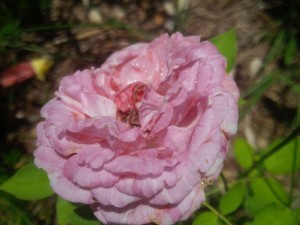
I have a desperate situation on my hands. Three roses in my garden stand in dire need of rescue before it is too late. Each one has a different sad story, but if I don’t intervene, they will all suffer the same tragic fate.
The first rose has a romantic name—‘Julio Iglesias’. ‘Julio’, is, of course, named for the Spanish singing star, whom my daughter refers to as “Enrique Iglesias’ father”. Julio’s rosy namesake is an appropriately flashy red and white-striped floribunda rose. My daughter saw the plant at Home Depot a few years ago and fell in love—so much so that she gave it to me and I have been responsible for it ever since.
I love striped roses, but for some reason, I have never felt the same kind of passion for ‘Julio’ as I feel for some of his striped relatives, like the gorgeous ‘Scentimental’ or the grand old Rosa gallica versicolor, better known as “Rosa Mundi”. Still, the rose was a lovely gift, so I planted it, tended it and watched as it bloomed bewitchingly in its first year. Its second year was not as impressive, compounded by the fact that the bush is sited in front of an ever-expanding clump of Shasta daisies. Clearly the daisies are much more macho than ‘Julio’, because they have engulfed him.
The smothering embrace of the daisies has been very bad for the rose and it is clearly ailing. It is time to cut back the daisies and get ‘Julio’ to a better place before the rose takes a permanent siesta.
I am ashamed to admit that I have forgotten the name of the second rose. It is another shrub rose with lovely cerise flowers. Unfortunately it suffered last winter and was rather puny-looking this spring. That puniness was a definite liability when the rose was crushed by utility company workmen who were connecting my electric meter to the neighbors’ house to provide them with emergency power after a storm.
In the workmen’s defense, it was dark when they were trying to connect the meter and they probably didn’t see the rose. When I viewed the wreckage the next day, it looked as if there was nothing left. However, four weeks later, a single stem and four leaves re-emerged from the soil. Any plant that determined is worthy of a second chance.
The third languishing rose is ‘Vick’s Caprice’, a gorgeous, fluffy, pink and white-dappled hybrid perpetual type, introduced in the United States sometime before 1889. I bought it from an heirloom rose vendor a few years ago when I was having a flirtation with hybrid perpetuals. ‘Vick’s Caprice’ is simply in the wrong place and that is the source of all its troubles. It is too near the edge of a border and has gotten accidentally whacked more than once by the string trimmer. It keeps coming back, but no plant can be resilient forever, so ‘Vick’s’ is going to have to pack a bag and move out.
All three invalid roses need full and constant attention, not to mention water and rose food. To make sure they get that kind of intensive care, I am going to lavish them with love and pot them up in separate, roomy containers until they regain strength. All three pots will go in the sunniest spot on my back porch, where I can see them as I come and go. This treatment has worked well for other sickly plants that have since been restored to new homes in the borders. If all goes well, it should do the trick for ‘Julio’, ‘Anonymous’ and ‘Vick’s Caprice’.
Why go to so much trouble when new, healthy roses are available just about everywhere and even unusual varieties like ‘Vick’s Caprice’ are only a few keystrokes away via internet merchandisers?
Part of the reason is guilt. I feel as if I have failed those roses through neglect, clumsiness or bad planning. Feeble though they are, they have not given up, so I will pour some energy into them.
And then there is the issue of potential. Restored to health, ‘Julio’ and friends will produce scores of gorgeous blooms for years to come. The prospect alone is enough to make me run for the rose food.
People get sentimental about all kinds of things, including comic books, old farm implements and antique spittoons. In that context, being a little attached to ailing roses doesn’t seem strange at all.
